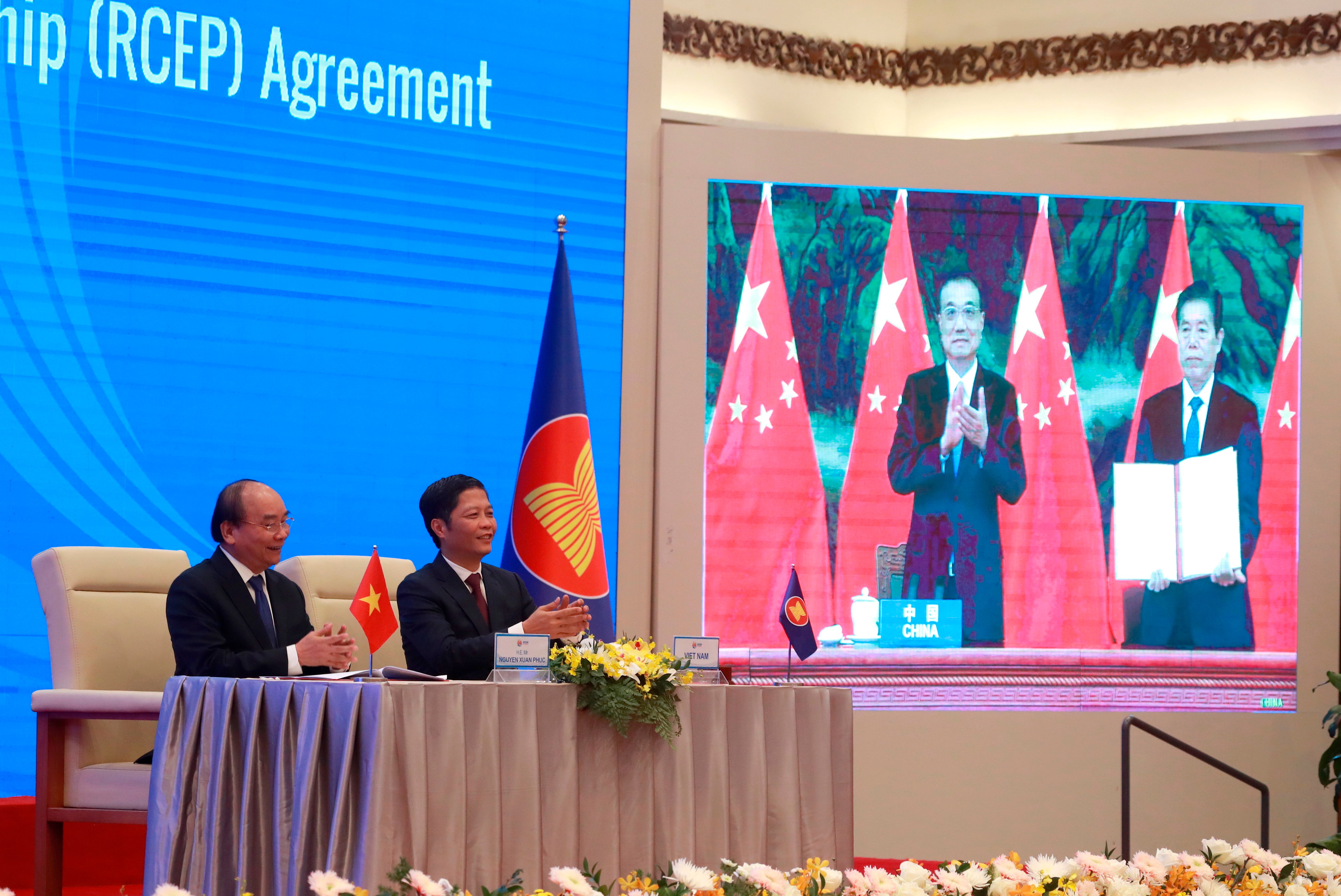Asia looks to China-focused trade bloc for virus recovery
Asian countries are looking to a China-centered trade bloc encompassing about a third of world trade and business activity to help power recoveries from the pandemic

Your support helps us to tell the story
From reproductive rights to climate change to Big Tech, The Independent is on the ground when the story is developing. Whether it's investigating the financials of Elon Musk's pro-Trump PAC or producing our latest documentary, 'The A Word', which shines a light on the American women fighting for reproductive rights, we know how important it is to parse out the facts from the messaging.
At such a critical moment in US history, we need reporters on the ground. Your donation allows us to keep sending journalists to speak to both sides of the story.
The Independent is trusted by Americans across the entire political spectrum. And unlike many other quality news outlets, we choose not to lock Americans out of our reporting and analysis with paywalls. We believe quality journalism should be available to everyone, paid for by those who can afford it.
Your support makes all the difference.Members of a China-centered Asian trade bloc that takes effect Jan. 1 are hoping the initiative, encompassing about a third of world trade and business activity, will help power their recoveries from the pandemic.
The 15-member Regional and Comprehensive Economic Partnership, or RCEP, includes China Japan, South Korea and many other Asian countries. It does not include the U.S. or India
The deal slashes tariffs on thousands of products, streamlining trade procedures and providing mutual advantages for member nations. It also takes into account issues such as e-commerce, intellectual property and government procurement. But it has less stringent labor and environmental requirements than those expected of countries in the European Union or the smaller Trans-Pacific Partnership which includes many of the same countries but not China.
RCEP is expected to boost trade within the region by 2%, or $42 billion, both through increased trade and also through diversion of trade as tariff rules change, experts say.
Extra help will be needed: Two years of lockdowns, border closures, mandatory quarantines and other restrictions have cost millions of people their jobs while also contributing to disruptions in manufacturing and shipping that are snarling supply chains worldwide.
Countries confronted with outbreaks of the fast-spreading omicron coronavirus variant have reined in recent moves to reopen to international travel.
Regional economies contracted by 1.5% in 2020. They’ve bounced back, with the Asian Development Bank forecasting growth at 7.0% this year — boosted by low year-before figures. But next year growth is expected to slow to 5.3%.
The pandemic slowed progress in ratifying the trade deal for some countries.
China was the first to ratify RCEP, in April, after it was signed in November 2020 at a virtual meeting of leaders from its 15 member countries. Indonesia Malaysia and the Phlippines have yet to do so, though they are expected to ratify it soon. Myanmar, whose government was ousted by the military on Feb. 1, ratified it but that is pending acceptance by other members.
Beijing is fully prepared for the new trading bloc, having already fulfilled 701 “binding obligations” for RCEP, Chinese vice minister for commerce Ren Hongbin said Thursday.
“RCEP is of great significance building new development patterns and a milestone in opening up our economy,” Ren said according to a transcript of a news conference on the ministry’s website. He said the block would draw member economies closer and “greatly boost confidence in economic recovery from the pandemic.”
Like any trade deal, RCEP has its detractors.
In a recent legislative hearing shown on YouTube, government officials urged Indonesian lawmakers to pass RCEP, one of three backlogged trade arrangements.
Elly Rachmat Yasin, a member of a commission responsible for agriculture, the environment, forestry and marine affairs, questioned Indonesia’s trade minister, Muhammad Lutfi, about the wisdom of Indonesia's involvement, noting that India opted out largely due to fears that Chinese imports would swamp its markets.
Lutfi responded that RCEP would help boost exports and attract extra inflows of up to $1.7 billion in foreign investment by 2040.
Philippine Trade Secretary Ramon Lopez says he expects lawmakers there to ratify the pact in January, after running out of time to get it done in December, when the government was busy dealing with the aftermath of a typhoon that struck on Dec. 16, leaving 375 people dead and hundreds of thousands without adequate housing.
The trade bloc is expected to open many service sector jobs to workers in member countries — a big draw for countries like the Philippines that rely heavily on remittances from migrant workers.
“RCEP will uplift GDP and lower poverty incidence. It will open up more market access for our exports and widen sourcing of needed inputs that will improve competitiveness of our manufacturing sector and exporters," Lopez said.
“There is no reason nor logic not to ratify RCEP," he said, adding that failing to do so would be “catastrophic" since investors would likely favor countries within the trading bloc.
——
Associated Press writers Jim Gomez in Manila and Niniek Karmini in Jakarta contributed.